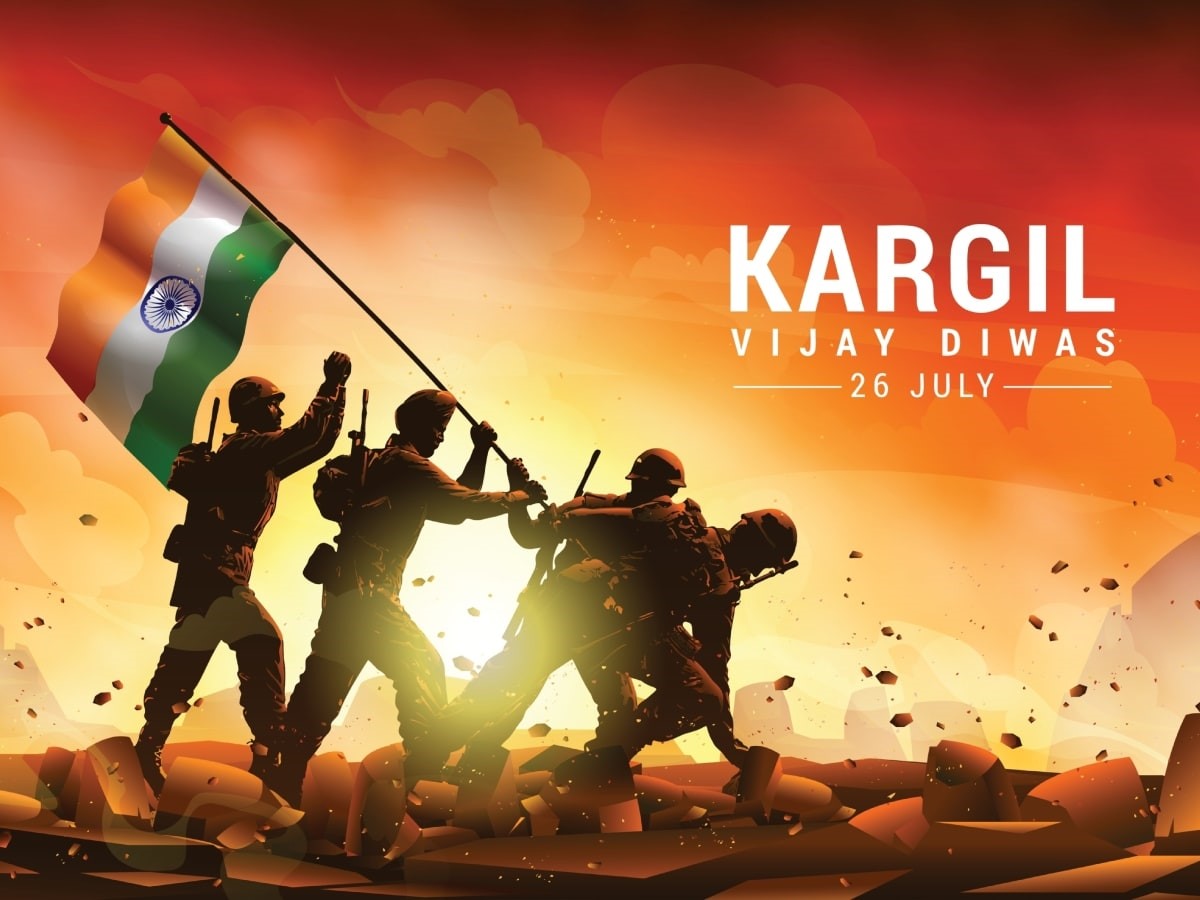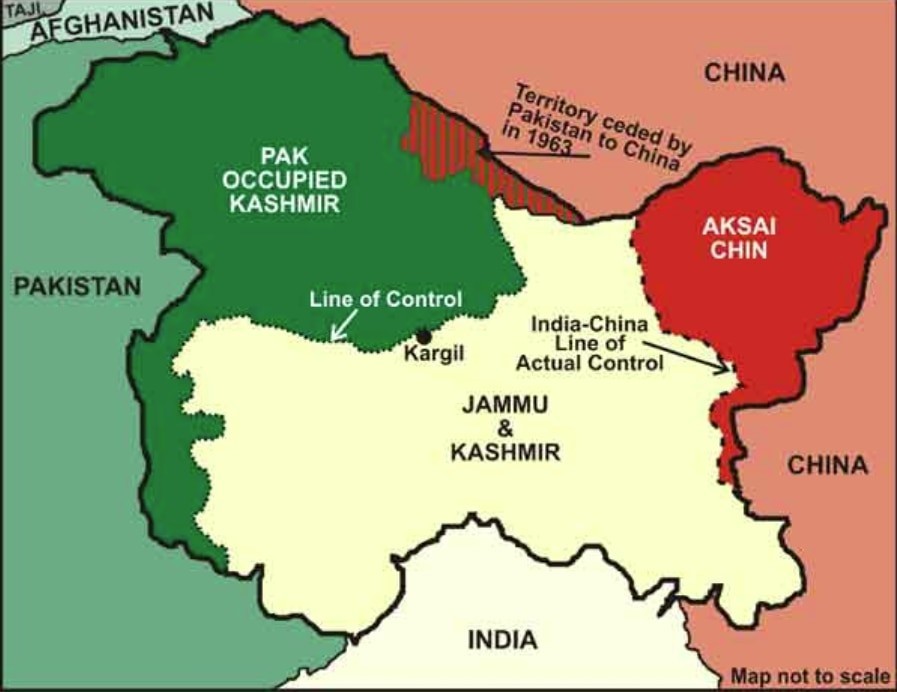Description

Disclaimer: Copyright infringement not intended.
Context
- July 26 is celebrated as Kargil Vijay Diwas every year to observe India’s victory over Pakistan in 1999.
History and Course of Events
- The two neighboring countries, which were involved in a significant conflict in 1971 that resulted in the formation of Bangladesh, experienced ongoing tensions in the subsequent years.
- Although direct armed conflicts have been limited, they have been vying for control over the Siachen Glacier by establishing military outposts on the nearby mountain ridges.
- The situation escalated further when both nations conducted nuclear tests in 1998.
- To ease the tension, they signed the Lahore Declaration in February 1999, which aimed to seek a peaceful and bilateral resolution to the Kashmir conflict.
- During the winter of 1998-1999, the Pakistani armed forces covertly trained and deployed troops to cross the Line of Control (LOC) and seize fortified positions that overlooked NH 1A in the Drass and Batalik Sectors of Kargil, Ladakh region. Their objective was to gain control over both military and civilian movements in the area.
- At the outset, the Indian troops believed that the infiltrators were terrorists or 'jihadis' with a radical agenda. However, as events unfolded, it became evident that the attack was part of a larger and more organized plan.
- In response, the Indian side was compelled to retaliate and deploy a massive force of over 200,000 Indian troops in the region.
- Thus, the armed conflict between Pakistan and India started after the Pakistani soldiers crossed the Line of Control (LoC) and entered the Kargil district of Jammu and Kashmir (now part of the Union Territory of Ladakh).
- The Indian Army launched a military operation, 'Operation Vijay' to drive out intruders from the Indian territory.
- Known as the Kargil War, it continued from May to July 1999.
- The brave Indian soldiers fought against the Pakistani Army and militants with great bravery and determination.
- The Indian military regained control of the contested territories. The war finally came to an end on July 26, 1999, with the seizure of 'Tiger Hill'.

Importance
- The Kargil War holds great significance for India and our armed forces.
- It showed the world that India is powerful enough to safeguard its territorial sovereignty.
- Kargil War was one of the toughest wars fought in the most inhospitable conditions, both due to its geographical and climatic conditions.
- The war was fought at extreme altitudes, with some of the battlegrounds reaching heights of over 18,000 feet. This presented unique challenges to both sides due to the harsh weather and terrain conditions.
- During the war, the Indian Army recaptured the strategic peaks of Tololing, Tiger Hill, and Point 4875, among others.
- The war saw the entire nation coming together to boost the morale of the security forces.
- Thousands of brave soldiers sacrificed their lives to protect the sovereignty and integrity of India.
- They fought in extremely challenging conditions and emerged victorious.

Significance of the day
- It was on this day 21 years ago that the Indian Army recaptured all the Indian posts in Kargil that had been occupied by Pakistan's army. Since then, July 26 has been observed annually to commemorate the sacrifices made by soldiers in this war.
- Captain Vikram Batra, Lt Manoj Kumar Pandey, Major Rajesh Singh Adhikari, Major Vivek Gupta and others were among the 527 brave soldiers who gave their lives for the country.
- Several event and parades are organised on this day in honour of these soldiers. The main ceremony is at the Kargil War Memorial in Drass.
- Kargil Diwas is a day of national pride. It is a reminder to the world about the courage, determination and professionalism of the Indian Armed Forces.
- It also holds great significance for the soldiers who lost their lives fighting to drive away the enemy from Indian soil. The day is celebrated to acknowledge the sacrifices of our armed forces.
- Kargil Diwas is another occasion for India telling the world about its commitment to peace, and also being ready to defend its borders and sovereignty if needed.
War and its Implications
- Kargil intrusion turned out to be Pakistan’s biggest strategic blunder as Islamabad could not foresee the global repercussions. Pakistan not only faced international ignominy and alienation, but Kargil paved the way for the US tilt toward India.
- For the first time, the US viewed India-Pakistan relations independently and objectively and slammed Pakistan for putting the two South Asian arch-rivals at the risk of a nuclear war.
- The US-India relation was to stand on its merit and no longer tied to the US-Pakistan relations.
- This became obvious during President Clinton’s visit to South Asia in 2000 when in India he spent five days and constructively engaged with Prime Minister Vajpayee. But Clinton’s Pakistan visit was of five hours and that to lecture Musharraf to stop cross-border terrorism.
- Later on President George W. Bush pursued a policy of de-hyphenation which was welcomed by Prime Minister Vajpayee which followed a series of foreign policy initiatives including the 2004 Next Step in Strategic Partnership which sought to expand the US-India ties to high-technology, defence, space, and civilian nuclear energy.
- Before the Kargil conflict, the US had imposed sanctions on India because of its nuclear test in 1998. Clinton administration sought to fix ties with India under the Strategic Engagement- the dialogue between the US Deputy Secretary of State Strobe Talbott and Indian Foreign Minister Jaswant Singh.
- This was also the time when India mounted the daunting task of justifying its nuclear test on Capitol Hill in which the Indian lobbying carried on by the India Caucus was significant. This was the most daring and ambitious diplomatic and political manoeuvring that India ever pursued since Independence aimed at clearing the doubts about its nuclear test and highlighting its security concerns.
- Clinton administration was adamant on India for signing the Comprehensive Test Ban Treaty (CTBT) which India refused to sign on the ground of it being an extension of the Nuclear Non-Proliferation Treaty (NNPT). For India, the NNPT undermined its security concerns and was biased in favour of permanent five.
- Kargil conflict also helped the Indian lobbying to consolidate its position in the US Congress which would only grow in its clout to play a decisive role in the passage of the US-India nuclear deal in the US Congress which ended the nuclear pariah status and dismantled the technology denial regime against India.
- Though 9/11 brought Pakistan in the US strategic relevance in the War on Terror in Afghanistan, the US relations with Pakistan since then has only deteriorated.
- Pakistan’s double game in its support to the US War on Terror was exposed when Osama bin Laden was found in Pakistan.
- President Barack Obama with his Indian counterpart Prime Minister Manmohan Singh and Prime Minister Modi converged on the issue of terrorism. But President Trump with PM Modi has taken the US-India ties convergence on terrorism and Pakistan a step ahead. A significant action by Trump in this regard has been the canceling of the US military funds to Pakistan on the ground of deceiving the US and using the Taliban to further its interests.
- Pakistan’s attempt to hyphenate itself in US-India relations has not been successful. Pakistani society has become more anti-American and Pakistan has drifted towards China strategically.
- Coming to the COVID-19 geopolitics era, China’s geopolitical game plan amid the humanitarian crisis is challenging the US in which Pakistan does not fit. China-Pakistan nuclear/defence bonhomie and China-Pakistan Economic Corridor have deepened their connivance and further put Pakistan off the US strategic radar.
- Pakistan is no longer needed by the US to bring down the Soviet Union from the Southern vantage point.
- No longer Pakistan is needed also for its past moderate Muslim state image for strategically engaging the energy-rich Middle East which is losing its relevance amidst the Paris Climate Summit goals and Greta Thunberg phenomenon, shift to renewable energy sources, the US shale gas revolution and new hydrocarbons sources.
- Pakistan has again resurfaced in the US move to wrap up its longest war in Afghanistan, but this is only going to be disappointing for the US.
- The US-India strategic partnership is crucial not only for China but also for Pakistan which is not a security solution but a security problem.
Kargil War- A lesson for India
- Kargil conflict was a watershed moment as it exposed India’s defence preparedness and set the US-India relations towards de-hyphenation from Pakistan.
- Though the Operation Vijay recaptured all the Indian posts in Kargil from Pakistan, the conflict exposed India’s dulled defence capability- from intelligence system to the shortage of artillery ammunition and precision-guided arms.
- But the conflict also pushed India to improve logistics and intelligence capabilities, focus on detailed renewal and backup policy, and towards a modern defence system.
- India embarked on the modernisation of the domestic defence industry of which the diversification of the arms acquisition from Russia to the other leading advanced defence nations became a major policy focus.
- Operation Vijay demonstrated that besides the Indian Army’s Mountain warfare capability the support of India’s air power was critical in the victory.
Relevance of Kargil War in today’s times
- The Kargil War fought in 1999 becomes more relevant in today’s tensed security environment on India’s North-Western border. The Chinese intrusion in the Galwan valley and Pakistani intrusion in Kargil draw similarity as both happened when India was trying to improve the relationship with Pakistan and China respectively.
- But also, both incidents have only smashed India’s hope of peace and pushed India to be more realistic in dealing with its two arch-rivals.
- With China’s aggressive military build-up and China-Pakistan security nexus only intensifying and when the India-China standoff is simmering in an exacting and rough terrain of Himalayas, India’s air power capability becomes significant.
- The French delivery of Mirage-2000 in 1999 and now Rafale is momentous and has boosted India’s air power. India’s ties with France is robust and resilient in which defence sector is striking. France has strongly supported India’s fight against Pakistan backed terrorism and Chinese military adventurism.
- Despite India’s progress in space and missile development programme, the continued dependency on import for high-end arm products exposes decades of lack of a clear-cut vision of its defence industry and modernisation of arms industry in a slapdash manner with huge cost and time overruns.
|
PRACTICE QUESTIONS
Q. The Lahore Declaration, signed in February 1999, aimed at improving relations between India and Pakistan but was eventually undermined by a war that had a lasting impact on the India-Pakistan relationship. Comment.
Q. Kargil conflict was a watershed moment as it exposed India’s defence preparedness and set the US-India relations towards de-hyphenation from Pakistan. Analyze.
Q. The Kargil War fought in 1999 becomes more relevant in today’s tensed security environment on India’s North-Western border. Elucidate.
|

https://www.livemint.com/news/india/kargil-vijay-diwas-2023-date-significance-history-indias-historic-win-in-1999-india-pakistan-war/amp-11690335932693.html














